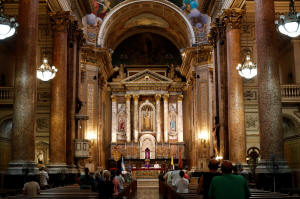In homeland of Pope Francis, long absence prompts prayers for return
 Send a link to a friend
Send a link to a friend
 [March 09, 2023]
By Lucila Sigal [March 09, 2023]
By Lucila Sigal
BUENOS AIRES (Reuters) - In the Buenos Aires shanty town area of Villa
21-24, Justina Ayala, 72, remembers the day Pope Francis left Argentina
for the Vatican 10 years ago. He has not been back to his homeland -
struggling with debt, economic crisis and poverty - since.
"We pray a lot that one day he will come back and hug us, since it is
far away and I, for one, will not be able to go there," Ayala said near
her local parish where she once met the pope when he was Cardinal Jorge
Bergoglio.
"When he went he told us 'don't worry, I'm going to come back right
away'," she said.
Francis, the first Latin American leader of the Roman Catholic Church,
marks 10 years as pope on March 13, during which time he has never
returned to his native Argentina, despite having visited the region
seven times.
Some contend that the 86-year-old pope, who now has mobility issues
relating to his knee, is conscious of the pressures he would face in
Argentina, which is divided politically, battling 99% inflation and near
40% poverty.
"I think he misses Argentina and it hurt him at the same time," said
Guillermo Marcó, a spokesman for then-Cardinal Bergoglio for nine years
who maintains a close relationship with him. "He knows if he comes here
they will tear him to pieces."
Marcó said Francis remained a strong figure, but the demands of his home
country were severe, with politicians on all sides likely to try to
exploit any visit.

"Who does he see, who doesn't he see, who does he receive? ...
Everything is going to be a problem. And I don't know if he is ready to
withstand such pressure," he said, adding the pope had always been a
critic of those in power.
Rogelio Pfirter, former ambassador to the Vatican who was a student of
Bergoglio when he taught at a Jesuit school in Santa Fe, said the pope
had more pressing global issues, while Argentina's tense politics was
also a deterrent.
"Argentina's reality, with all its rough edges, with its eccentricity
and its obsession with interpreting everything politically, perhaps does
not contribute to creating the right atmosphere for a pastoral visit,"
he said.
[to top of second column]
|

Catholic faithfuls pray during a mass at
the Basilica San Jose de Flores, where Pope Francis used to attend
in his childhood, in Buenos Aires, Argentina March 6, 2023.
REUTERS/Agustin Marcarian

PERONIST POPE?
Some in Argentina claim Pope Francis as a Peronist, part of the
powerful political movement forged by Juan Domingo Perón in the
1940s based on social justice values. The current Peronist ruling
coalition is behind in opinion polls ahead of a general election
late this year.
"His way of behaving has a lot to do with Peronist doctrine," said
Lorenzo 'Toto' de Vedia, a priest in the Virgen de los Milagros de
Caacupé Parish in the 21-24 quarter.
Bergoglio, the son of Italian immigrants, lived modestly when he was
archbishop of Buenos Aires, traveled by public transport and kept a
low profile when he visited the poor in shanty towns in the city,
where many still remember him.
Many, though, fear both sides of the political aisle - the Peronists
and the resurgent conservative opposition - would try to use a visit
from the pope for their own political gain, stirring up an already
fractious election race.
Tensions boiled over in September last year when a man tried
unsuccessfully to shoot the powerful but divisive Vice President
Cristina Fernandez de Kirchner at point-blank range. President
Alberto Fernandez has also lashed out at the judiciary and tried to
impeach members of the Supreme Court.
Bergoglio had at times a rocky relationship with Fernandez de
Kirchner, a former two-term president from 2007-2015. She accused
him of taking sides politically and once avoided him by shunning a
traditional Mass in Buenos Aires.
"We shouldn't rule out the possibility that (the pope) is concerned
his presence will sharpen the political divide," De Vedia said.
De Vedia added however that a papal visit would "do a lot of good"
for the hard-hit voters in the country. Bergoglio, he pointed out,
had gained the nickname "Papa villero" - Pope of the villas - due to
his closeness with the people.
"They felt taken into account, represented. They identify with him
because somehow one of ours got there," he said.
(Reporting by Lucila Sigal; Editing by Adam Jourdan and Janet
Lawrence)
[© 2023 Thomson Reuters. All rights
reserved.]This material may not be published,
broadcast, rewritten or redistributed.
Thompson Reuters is solely responsible for this content. |